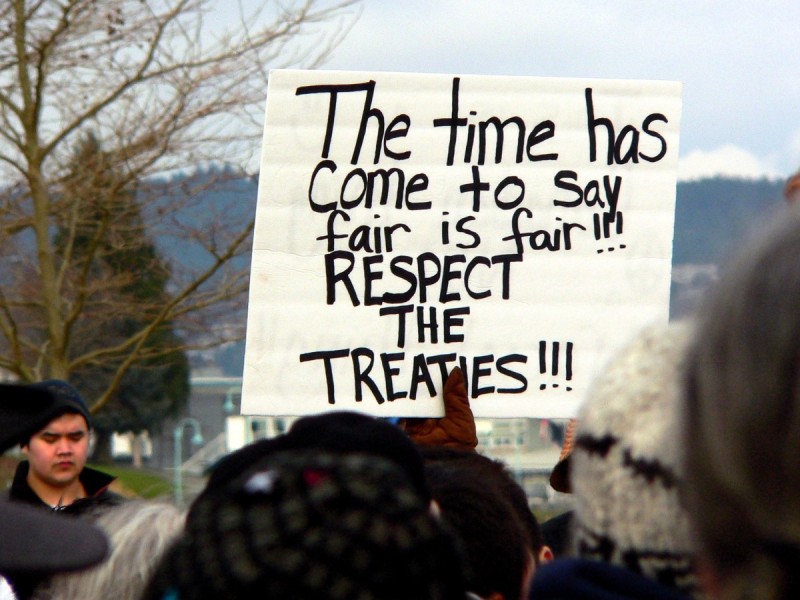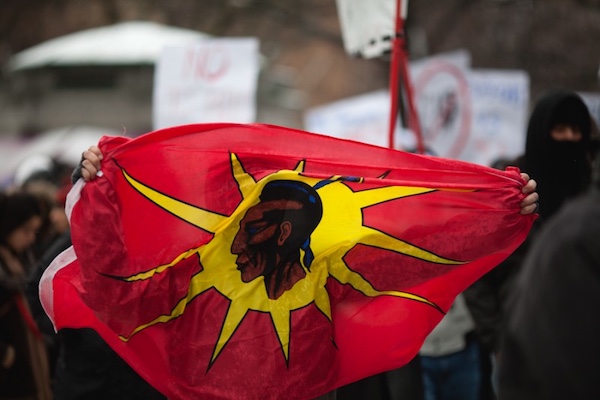Voters elected Prime Minister Mark Carney as a rebuke of Trump and Trumpism. Yet it appears Carney has pulled a bait-and-switch: rather than continuing Trudeau-era politics, the PM has veered sharply to the right, pushing Canadian liberalism to its breaking point. Soon, he will face a crucial decision: back down or abandon liberalism altogether.
Carney’s agenda so far has been one defined by austerity, tighter immigration and border controls, and the expansion of policing and militarism. But the issue most likely to provoke sustained and intense backlash—and to rupture Canadian liberalism—is Bill C-5, the One Canadian Economy Act, which passed in June. C-5 allows the federal government to exempt so-called “nation-building” projects of its choosing from environmental review. According to most legal interpretations, it will also allow the government to bypass requirements for Indigenous consultation, let alone consent.
When I say liberalism here, I mean the central political philosophy underpinning what are commonly called “Western” democracies. Rooted in Enlightenment-era thinking, liberalism positions individual political rights and equality as the foundation of a free and just society. In principle, it’s appealing—but in practice, it has always been marked by a yawning gap between its aspirational ideals of universalism and its deeply unequal, often genocidal, reality.
The precise contours of this gap have varied across time and place, but a useful example lies in the American Revolution. On one hand, it was a fight for democracy and the principle that “all men are created equal” (noticeably excluding women even at the aspirational level). Yet the state it created was built on and entrenched systems of slavery and genocide. Its lofty rhetoric and Enlightenment ideals only applied to property-owning white men, thanks to a racial regime that drew narrow boundaries around who counted as a “civilized” human—and thus who deserved universal rights.
Some argue that the project of liberalism has been one of gradual, incremental progress toward resolving that contradiction (“the long arc of history bends towards justice”), and perhaps over a long enough timeline, that will prove true. But today, both globally—where are the universal rights of Palestinians?—and nationally, that contradiction remains central to liberalism’s existence in the world.
Canada has systematically denied the rights of countless peoples throughout its brief history. But no contradiction has more profoundly shaped its legal, political, and cultural foundations than its treatment of Indigenous peoples. Time and again, Canada publicly champions human rights, Indigenous rights, and the principle of self-determination, only to betray those ideals with calculated repression. Behind the polished rhetoric lies a brutal reality: a state that speaks the language of reconciliation while deploying the machinery of violence against the very communities it claims to support.
The role of Indigenous rights and title in Canadian society is shaped by the constant push and pull between Indigenous resistance—sometimes leveraging liberalism’s own progressive ideals—and the structural reality of a profit-driven, capitalist state. This tension creates glaring policy dissonance. One notable example: British Columbia passed its Declaration Act, which enshrined the UN Declaration on the Rights of Indigenous Peoples into provincial law—just months before the RCMP carried out a high-profile raid on the Unist’ot’en Camp.
This contradiction between liberalism’s stated principles and capitalism’s demands represents a kind of limit on the Canadian state. Push too far—triggering both Indigenous resistance and civil unrest from the many Canadians who consider themselves committed to liberal values, including reconciliation—and you face serious trouble.
We saw this in 2012, when Prime Minister Stephen Harper’s omnibus Bill C-45 sparked a nationwide movement, Idle No More, that, along with the Truth and Reconciliation Commission, reshaped Canada’s political and cultural landscape.
Now, we’re seeing it again with Bill C-5, which allows the federal government to exempt so-called “nation-building” projects of its choosing from environmental review.

Idle No More protest in Nanaimo, British Columbia, 2013. (Photo: Russell McNeil/Flickr)
Weeks after the bill passed, Carney staged a kind of performative summit with select Indigenous leaders, attempting to smooth things over retroactively. He closed the event by declaring that Bill C-5 is “the law of the land.” As Mohawk policy analyst Russ Diabo remarked,
He sounds a lot like Stephen Harper to me!
Unsurprisingly, this retroactive consultation has failed to allay concerns. Grand Chief Cody Diabo of the Mohawk Council of Kahnawà:ke called the summit “a complete disaster.” Robert Jago, a writer from the Kwantlen First Nation, later observed,
Once again, it seems like the only real options for First Nations are protests in the streets and challenges in the courts.
Sure enough, First Nations have already launched legal challenges to halt Bill C-5. But unless the courts move with uncharacteristic speed (and with an uncharacteristically high regard for Indigenous rights) the real battle over Bill C-5 will unfold not in courtrooms but on railroad tracks, forestry roads, at ports, and in cities across the country. When this next wave of Indigenous-led protest emerges—another Idle No More or #ShutDownCanada—Carney will find himself at a fork in the road.
One path—backing down, making concessions, and returning to the slower, familiar game of counterinsurgency against dissenting Indigenous nations—would take Canada back to its classic liberal détente.
A decade ago, that was the only real path forward. But today, shifting national and global political contexts have opened a second path for Carney: abandoning liberalism altogether.
Carney is a big-L Liberal, part of a party historically more inclined to gesture toward reconciliation and human rights, and more vulnerable to left-leaning criticism than its Conservative counterparts. But that Liberal commitment to liberalism has been conspicuously absent from his government so far. Carney’s Liberals—like the UK’s Labour Party—seem to be dipping their toes into the authoritarian waters, tempted by the global fascist turn vanguarded by Trump, Hungary’s Viktor Orbán, Turkey’s Erdoğan, and Israel’s Netanyahu. Rather than defending the “liberal international order”—eviscerated under their watch in Gaza—Carney and his centrist peers appear to view its collapse as a chance to escape the constraints that liberalism once imposed on their domestic and foreign agendas.
The looming battle over Bill C-5—and Canada’s increasingly aggressive support for extractive industries—marks a critical turning point for the Carney government. It will determine not only the pace of its authoritarian drift but also the future of the Canadian settler project itself. If Carney pushes ahead with pro-industry policies that trample Indigenous rights and further erode an already fragile regulatory framework, it will ignite widespread resistance. And if his government responds as expected, with heightened surveillance and violent repression, Canadian liberalism will reach its breaking point.
If Carney chooses that path, there will be no return. The version of Canadian liberalism we once knew—flawed, but at least rhetorically committed to rights and reconciliation—will be gone, for better and for worse. What takes its place remains uncertain: perhaps a corporatist authoritarianism serving the interests of the (mostly American) billionaires with whom Carney is aligned, or perhaps a new political compact, forged by a powerful Indigenous-led people’s movement.
But one thing is clear: the defining struggle is between Indigenous peoples and anti-fascist settlers on one side, and a global elite on the other—an elite that has shown it has no red lines, not even in the face of livestreamed genocide or mass starvation. If we are to have any chance, our alliances must put decolonization at the centre and build a new relationship between Indigenous peoples and settlers, one rooted in the spirit of cooperation and respect that the original treaties were meant to uphold.
Nick Gottlieb is a climate writer based in northern BC and the author of the newsletter Sacred Headwaters. His work focuses on understanding the power dynamics driving today’s interrelated crises and exploring how they can be overcome.

